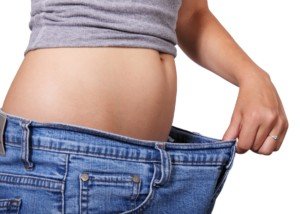
So just how safe–or harmful–is intentional weight loss while you’re breastfeeding your baby?
The medical establishment has asserted that women must be careful about losing weight during breastfeeding, but this assertion may seem ambiguous; after all, there are variables for every woman.
Weight loss may mean muscle loss and/or fat loss. Muscle loss, especially in a woman, is never a good thing.
A drastic calorie restriction diet will result in the loss of precious muscle (the body’s metabolic furnace as well as immune system support).
But what would a women’s health physician have to say about this?
“Excessive weight loss can affect both the quality and the amount of breast milk,” says Randy Fink, MD, Director of the Center of Excellence for Obstetrics & Gynecology in Miami, FL.
This excess may refer to muscle loss, as well as too much fat lost over a short amount of time.
Dr. Fink continues, “Most women lose weight gradually in the first six months postpartum, and weight loss in general is slower in women who were obese before pregnancy.
“Losing a moderate amount of weight by diet and exercise has not been shown to negatively affect breastfeeding, but may have a significant effect on mom’s overall health.
“Breastfeeding moms should consume at least 1,500 calories a day in order to maintain the quantity and nutritional content of milk.”
Again, there are variables that will affect how rapidly a woman loses weight.
Many health and fitness experts believe that consuming 1,500 calories a day is the bare minimum requirement necessary for a moderately active woman, and those 1,500 calories should be nutrient-dense.
In fact, if a woman is moderately active, 1,500 calories won’t be enough for optimal metabolic functioning, because the body will have a tendency to metabolically slow down to conserve some calories.
Breastfeeding with Weight Loss
Suppose before giving birth, a woman was quite overweight as a result of eating, say, 3,200 calories a day. Suppose this was her norm long before she became pregnant.
Now let’s suppose postpartum, during breastfeeding, this woman decides to lose weight. She cuts back to 1,700 calories per day, down from the average 3,200.
This creates a daily caloric deficit of 1,500 calories. One pound of fat = 3,500 calories.
Upon doing the math, you will see that each week, she will lose 3 pounds of fat.
In general, it’s recommended that weight loss be no more than 2 pounds per week.
But in this theoretical and very realistic case, is it safe, since her “diet” is actually 200 calories more per day than that minimum caloric requirement of 1,500?
Dr. Fink explains: “Yes, I believe this is okay. The overweight mom is not calorically deprived and should be able to lose weight safely while breastfeeding.
“I would absolutely recommend she remain on a multivitamin or prenatal during breastfeeding, to be assured she does not become challenged by some particular deficiency.
“I feel particularly strong about having DHA (a/k/a omega-3, a/k/a fatty acids, a/k/a fish oil) as a supplement when breastfeeding, as it has been shown to have benefits to both mom and baby. This may be particularly true for mom if she is overweight.”
In summary, it’s safe to lose excess weight during breastfeeding. But like any weight loss regimen, safety standards should be met:
1) Get adequate nutrition within your caloric limits, 2) Focus on portion control, 3) Get plenty of fruits, vegetables, fiber and protein; limit sugar and processed foods, 4) Drink plenty of water, and 5) Exercise for one hour daily.










































